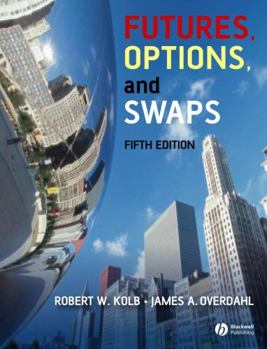Futures, Options, and Swaps
Select Format
Select Condition 
Book Overview
A new and updated edition of the most readable, comprehensive text available on derivatives markets.
Format:Hardcover
Language:English
ISBN:1405150491
ISBN13:9781405150491
Release Date:February 2007
Publisher:Wiley-Blackwell
Length:848 Pages
Weight:3.70 lbs.
Dimensions:1.7" x 7.8" x 9.8"
Customer Reviews
5 ratings
Great book even for those not familiar with Derivatives
Published by Thriftbooks.com User , 15 years ago
I found this book very useful, easy to read, and easy to navigate when trying to quickly find how to structure hedges or trades. I was also lucky enough to have one of the authors as my professor. Though I highly recommend previous coursework in Derivatives, this book will also introduce basic fundamentals of Derivatives.
Excellent textbook with real-world examples
Published by Thriftbooks.com User , 15 years ago
I bought this book for one of my MBA classes and it's a perfect textbook that goes into detail, has great examples, and even has some fascinating side facts. For example, in Chapt. 2 the author explains all the hand signals/motions for futures trading in the pit at the CME/NYMEX. Overall, I couldn't be happier with the book and how much I have learned.
Much better than many realize
Published by Thriftbooks.com User , 19 years ago
Let's face it: the big Kahuna in this space is Hull's 6th Edition of "Options, Futures, and Other Derivatives" (I actually prefer the 5th Edition), which is frequently referred to as "The Bible" by financial quants. Paul Wilmott's two volume "Quantitative Finance" also has a solid following, in addition to growing appreciation for Mark Joshi's "The Concepts and Practice of Mathematical Finance." Robert Kolb's "Futures, Options, and Swaps" therefore is often confined to an "also-ran" and treated as unserious because of its inclusion in the CFA curriculum. This is unfair, and for most undergraduate and MBA students who are not destined for derivatives dealing desks, and even many who are, Kolb is the better volume. Critics of Hull frequently cite that he is dry and technical to the point of somnolence. For Wilmott the opposite is the case. Critics hold his tone is flippant and that he glosses over major dimensions. My own view is these harsh reactions to these fine authors are exaggerations, but do have some evidence to support their expression. This, as a professor, leads me to the conclusion that for many students the author's tone is a major factor in their successful engagement with a fundamental teaching text. This leads me to Kolb's excellent works. Many undergraduate and some MBA students of derivatives use "Hull lite" ("Fundamentals of Futures and Options Markets"), but I encourage the wider adoption and use of Kolb's "Futures, Options, and Swaps." Kolb is superior to Hull for tone, accessibility, lucidity, and utility. Where Hull reaches for a completist coverage of obscure pricing models, Kolb's coverage is instead complete in a practical sense, while not abandoning treatment of less well-known options and their pricing models. Kolb's clarity is commendable, and never dry. Kolb does not gloss over or ignore difficult topics, and his style is never pedantic or superficial. This text does, however, contain any number of horrible errors and editing snafus that frustrate the reader. The errata sheet from the publisher does little to ameliorate the pain from these howlers. One wonders how a book can contain so many errors in such a competitive field. But it is fairly easily explained: because of Kolb's adoption by the CFA curriculum, there is a floor of near guaranteed sales that creates a non-competitive economic rent. I particularly recommend Kolb over Hull and Wilmott for those students whose background is not mathematics, engineering, or hard sciences. While the book is technical, it is not written in near-code geek speak. For my MBA students who are "poets" rather than "rocket scientists" Kolb wins as hands down favorite. Hull remains excellent for experts, PhD students, technicians, and pricing specialists, however, Kolb certainly deserves wider respect and use by the majority of students of derivatives. In short, while flawed, Kolb is an excellent and accessible work. I recommend the wide adoption of Kolb's "Futures, Options, and Sw
Comprehensive book on Derivatives
Published by Thriftbooks.com User , 24 years ago
Got many books on derivatives, but Kolb's is my favourite one. He covers the topic in a slightly less quantitative way than Hull does and goes straight to all the different derivatives while avoiding any further explanations like Ito's Lemma etc. I especially liked the part on swaps with many examples like flavoured swaps or equity swaps. Nevertheless, if you're looking for a good software, than I would recommend The Complete Guide to Option Pricing Formulas (build on Excel VBA).
Expensive Books
Published by Thriftbooks.com User , 25 years ago
This and four other books required for the CFA level I exam are priced a lot more than that offered by the AIMR






